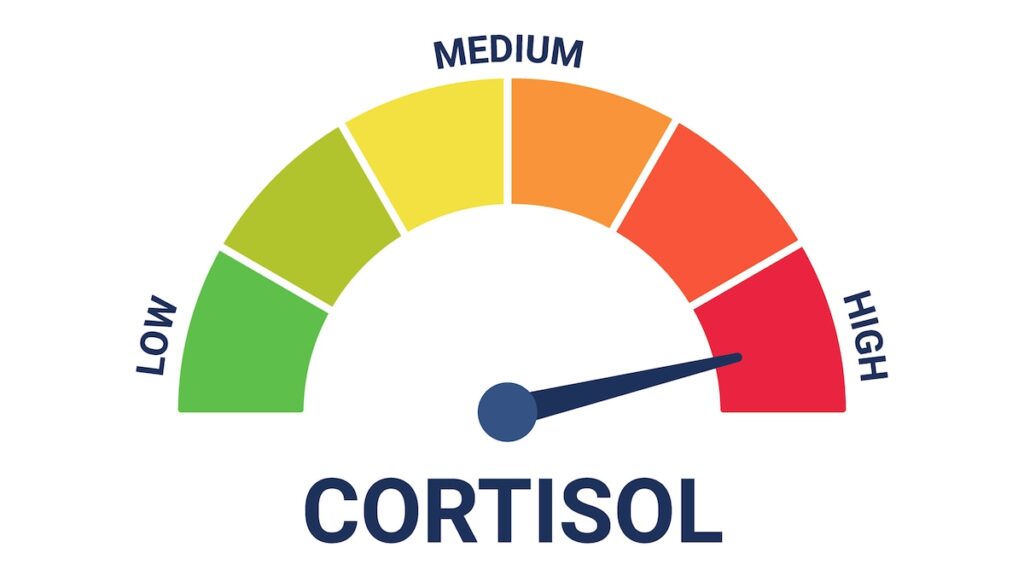5 Warning Signs Your Body May Have High Cortisol And 5 Simple Ways to Manage It

Cortisol, often referred to as the “stress hormone,” is crucial for our body’s response to stress. Cortisol is a crucial hormone produced by the adrenal glands. It plays a vital role in regulating various bodily functions, including metabolism, immune response, and blood pressure. While short-term cortisol spikes are normal, chronic stress can lead to prolonged elevated cortisol levels, which can have detrimental effects on physical and mental health. Recognizing the signs and taking steps to manage it is essential.
Also Read: Do You Tend To Stress Eat? Nutritionist Shares 3 Simple Foods That May Help
High cortisol levels can lead to a range of health issues, such as:
- Weight Gain: Increased appetite and altered metabolism can contribute to weight gain, particularly around the midsection.
- Impaired Immunity: Chronic stress can weaken the immune system, making you more susceptible to infections and illnesses.
- Digestive Issues: High cortisol levels can disrupt digestion, leading to problems like constipation or diarrhoea.
- Sleep Disturbances: Elevated cortisol levels can interfere with sleep patterns, leading to insomnia and fatigue.
- Mood Disorders: Chronic stress can contribute to mood disorders like anxiety and depression.
- High Blood Pressure: Prolonged exposure to high cortisol levels can increase blood pressure, which can lead to heart disease and stroke.
Here Are 5 Signs of High Cortisol
In an Instagram post, dietitian Manpreet Kalra revealed 5 signs that indicate high cortisol levels in the body.
- Difficulty Waking Up: If you find yourself struggling to wake up in the morning, even after a full night’s sleep, it could be a sign of high cortisol levels.
- Back Hump: A rounded upper back, often referred to as a “buffalo hump,” can be a physical manifestation of chronic stress and high cortisol.
- Extreme Morning Hunger: Increased appetite, particularly in the morning, can be a symptom of elevated cortisol levels.
- Moon Face: A round face with a puffy appearance can be a result of high cortisol, as it can lead to fluid retention.
- Chronic Fatigue: Persistent fatigue, even after adequate sleep, can be a sign of chronic stress and high cortisol.
Also Read: 5 Herbs That Are Also Natural Anti-Depressants
How To Manage High Cortisol
- Start your day with a glass of warm water mixed with a quarter teaspoon of rock salt. This simple practice can help regulate cortisol levels and hydrate your body.
- Avoid caffeine in the first hour after waking up. Caffeine can disrupt your body’s natural cortisol rhythm, leading to increased stress and anxiety.
- Spend some time outdoors, especially in the morning, to regulate your circadian rhythm and reduce cortisol levels.
- Consider supplementing with vitamin D, as it plays a crucial role in regulating cortisol production.
- Instead of completely avoiding carbohydrates at night, opt for balanced meals that include complex carbohydrates like whole grains. This can help stabilize blood sugar levels and promote better sleep, leading to balanced cortisol levels.
Balanced Dinner Meal Ideas For High Cortisol:
Here are some balanced dinner meal ideas dietitian Manpreet Kalra suggested to help manage cortisol levels:
- Samak Rice and Yellow Moong Dal Daliya with Veggies: This light and nutritious meal is easy to digest and provides essential nutrients.
- Oats and Green Moong Dal Appe: A delicious and healthy twist on the traditional appe, this dish is packed with protein and fibre.
- Millet Missi Roti with Seasonal Vegetables: Millet roti is a healthier alternative to wheat roti and can be paired with a variety of vegetables for a balanced meal.
- Paneer Stuffed Millet Roti with Sauteed Vegetables: A flavorful and satisfying meal that is easy to prepare.
- Sattu Stuffed Roti with Coriander Chutney: Sattu, a roasted gram flour, is a rich source of protein and fibre. It can be used to make delicious and healthy rotis.
By incorporating these tips and dietary changes into your daily routine, you can effectively manage cortisol levels, reduce stress, and improve your overall well-being.








